Related Research Articles

ACT New Zealand, also known as the ACT Party or simply ACT, is a right-wing, classical liberal, right-libertarian, and conservative political party in New Zealand. It is currently led by David Seymour, and is in coalition with the National and New Zealand First parties, as part of the Sixth National government.

Nicolas Rex Smith is a New Zealand politician who served as a Member of Parliament (MP) for the National Party from 1990 to 2021. He served as a Cabinet minister, holding various posts including Minister for Building and Housing, Minister for the Environment, Minister for Climate Change Issues, and Minister of Local Government. For a brief time between October and November 2003 he was the deputy leader of the National Party, then in opposition under Don Brash.
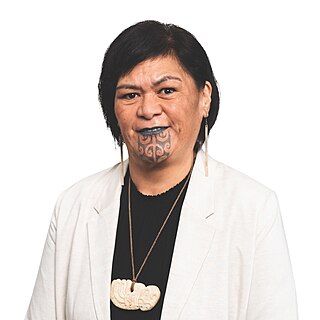
Nanaia Cybele Mahuta is a New Zealand former politician who served as the Minister of Foreign Affairs of New Zealand from 2020 to 2023. A member of the New Zealand Labour Party, Mahuta served as the Member of Parliament (MP) for 27 years, at first for the party list and then for three different Māori electorates, latterly for Hauraki-Waikato. Mahuta served as Minister of Foreign Affairs from 6 November 2020 to 11 November 2023. She received international recognition as the first woman to hold the Foreign Affairs portfolio. In October 2022, Mahuta became the Mother of the House, having served continuously in the House of Representatives since the 1996 general election. She lost her seat in parliament in the 2023 general election to Te Pāti Māori candidate Hana-Rawhiti Maipi-Clarke, who was subsequently Baby of the House.
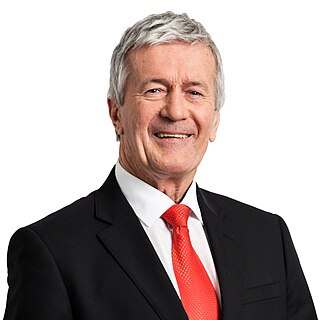
Damien Peter O'Connor is a New Zealand Labour Party politician who served as Minister of Agriculture, Minister for Biosecurity, Minister for Trade and Export Growth, Minister for Land Information and Minister for Rural Communities in the Sixth Labour Government. He previously served as a cabinet minister in the Fifth Labour Government. He had been a member of Parliament since 1993 and represented the West Coast-Tasman electorate. As of 2023 he is on the Labour list.

David William Parker is a New Zealand lawyer, businessman and politician who has been a Labour Party Member of Parliament since 2002.
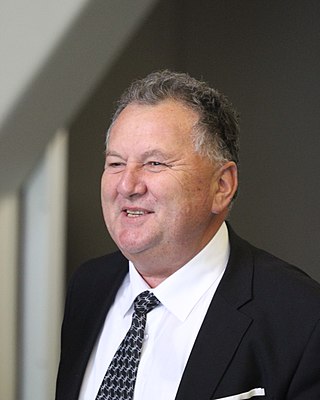
Shane Geoffrey Jones is a New Zealand politician and a member of the New Zealand House of Representatives for the New Zealand First party.

Aupito Tofae Su'a William Sio is a politician who became a member of the New Zealand House of Representatives on 1 April 2008 for the Labour Party as a list MP. From the November 2008 election to 2023, he represented the Māngere electorate.

Louisa Hareruia Wall is a New Zealand former double international sportswoman, former politician, and human rights advocate. She represented New Zealand in both netball as a Silver Fern from 1989 to 1992 and in rugby union as a member of the Black Ferns from 1995 to 2001, including as a member of the 1991 World Netball Championships runner-up team and 1998 Women's Rugby World Cup winning team.
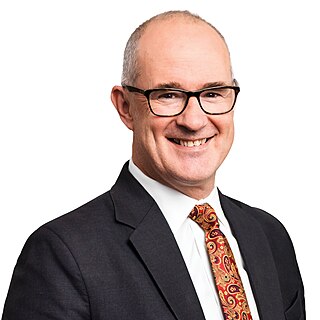
Philip Stoner Twyford is a politician from New Zealand and a member of the Labour Party. He has been a Member of Parliament since 2008. He is the Labour Party MP for Te Atatū.

Eugenie Meryl Sage is a New Zealand environmentalist and former politician. She was a Green Party Member of Parliament in the New Zealand House of Representatives from 2011 to 2023.
Ian Robert Flockhart McKelvie is a New Zealand politician. He represented the National Party in the New Zealand House of Representatives from 2011 to 2023.

Melissa Heni Mekameka Whaitiri is a New Zealand politician and former member of the New Zealand House of Representatives. She was first elected to Parliament in the 2013 Ikaroa-Rāwhiti by-election for the Labour Party.

Peeni Ereatara Gladwyn Henare is a New Zealand Labour Party politician who has been a member of the New Zealand parliament since the 2014 general election. Henare held the Tāmaki Makaurau Māori electorate since 2014 before being defeated by Te Pāti Māori's Takutai Tarsh Kemp in the 2023 general election.
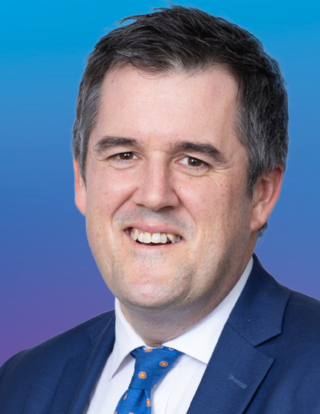
Christopher Bishop is a New Zealand politician for the National Party. He was first elected to the New Zealand House of Representatives in 2014 as a list MP. Bishop won the Hutt South electorate in 2017 but lost the seat in 2020. He returned to Parliament as a National list MP and served as National spokesperson for Housing and Infrastructure and was the Shadow Leader of the House. He was the Chairperson of National's 2023 Election Campaign. He is the current MP for Hutt South. He is a former lobbyist for tobacco company Phillip Morris.

Chlöe Charlotte Swarbrick is a New Zealand politician. Following a high-profile but unsuccessful run for the 2016 Auckland mayoral election, she became a parliamentary candidate for the Green Party of Aotearoa New Zealand, standing in the 2017 New Zealand general election, and was elected as a member of the New Zealand Parliament at the age of 23. In the 2020 election, Swarbrick was elected as the Member of Parliament for Auckland Central, becoming the second Green Party MP ever to win an electorate seat, and the first without a tacit endorsement from a major party leader. She retained Auckland Central in the 2023 election. In March 2024, she was elected co-leader of the Green Party. Swarbrick is Green Party Spokesperson for Mental Health, Drug Law Reform, Revenue, Climate Change, and Finance.

Virginia Ruby Andersen is a New Zealand politician. She has been a Member of Parliament in the House of Representatives for the Labour Party since the 2017 New Zealand general election.

Daniel Peter Rosewarne is a New Zealand politician and former military officer. He was a Member of Parliament in the New Zealand House of Representatives for the New Zealand Labour Party from July 2022 until October 2023.

Jamie Ross Strange is a New Zealand politician. He is a Member of Parliament in the House of Representatives for the Labour Party.

The Overseas Investment Amendment Act 2018 is a New Zealand bill that amends the Overseas Investment Act 2005 to ban most non-resident foreigners from buying existing houses, by classifying them as sensitive land and introducing a residency test. Australian citizens are exempt from this rule as they are considered New Zealand residents per the Trans-Tasman Travel Arrangement. Singaporean citizens are also exempt due to free trade rules. The Overseas Investment Amendment Act was supported by the Labour–led coalition government but was opposed by the opposition centre-right National and libertarian ACT parties. It passed its third reading on 15 August 2018 and received royal assent on 22 August.
Mark Stuart Cameron is a New Zealand politician and dairy farmer. He has been a member of Parliament for ACT New Zealand since the 2020 general election.
References
- ↑ "Candidates". ACT. Retrieved 18 October 2020.
- ↑ "Smith, Damien". Hansard. New Zealand Parliament. 25 November 2022. Retrieved 21 June 2022.
- 1 2 3 4 5 6 "Address in reply debate". Hansard. New Zealand Parliament. 10 February 2021. Retrieved 25 October 2023.
- 1 2 "ACT Party candidate profiles: Who might join David Seymour in Parliament?". RNZ . 15 October 2020. Retrieved 29 May 2021.
- ↑ Harrowell, Chris (29 September 2020). "Damien Smith: 'Gap between doers and talkers'". Times. Retrieved 18 October 2020.
- ↑ "Botany – Official Result". Electoral Commission . Retrieved 6 November 2020.
- ↑ "ACT candidate Stephen Berry resigns due to 'exhaustion' from campaign preparation". Newshub . 6 July 2020. Archived from the original on 6 July 2020. Retrieved 6 July 2020.
- ↑ "ACT list candidate Damien Smith could be heading for parliament". RNZ . 9 October 2020. Retrieved 18 October 2020.
- ↑ "Election results: David Seymour's new Act". The New Zealand Herald . 17 October 2020. Retrieved 17 October 2020.
- ↑ "2020 General Election and Referendums – Official Result Successful Candidates". Electoral Commission . Retrieved 6 November 2020.
- 1 2 "Smith, Damien - New Zealand Parliament". www.parliament.nz. Retrieved 24 October 2023.
- ↑ "Productivity | May 3rd 2008 Edition". The Economist. ISSN 0013-0613 . Retrieved 25 October 2023.
- ↑ Smith, Damien (31 August 2022). "Overseas Investment (Exempt Investment from OECD Countries) Amendment Bill — First Reading". www.parliament.nz. Retrieved 25 October 2023.
- ↑ Ensor, Jamie (21 July 2022). "ACT MP Damien Smith says New Zealand is 'like North Korea without the nukes' in terms of foreign investment". Newshub . Archived from the original on 25 July 2022. Retrieved 25 October 2023.
- 1 2 "Overseas Investment (Exempt Investment from OECD Countries) Amendment Bill". bills.parliament.nz. Retrieved 24 October 2023.
- ↑ "Parliament rejects move to free up overseas investment rules". NBR | The Authority since 1970. 22 September 2022. Retrieved 24 October 2023.
- ↑ Trevett, Claire (12 July 2023). "Act MP opts out of standing for re-election ahead of party list ranking". The New Zealand Herald . Retrieved 11 July 2023.
- ↑ Damien Smith - ACT List Member of Parliament (22 August 2023). "We've had to cancel my Valedictory Speech as I have a severe chest infection (recovering). Apologies. Gutting. But that's Life. Health first. Thanks for all your messages of support today and over the last 3 years". www.facebook.com. Archived from the original on 25 October 2023. Retrieved 25 October 2023.
- 1 2 Smith, Damien (30 August 2023). "Fair Digital News Bargaining Bill — First Reading - New Zealand Parliament". www.parliament.nz. Retrieved 25 October 2023.